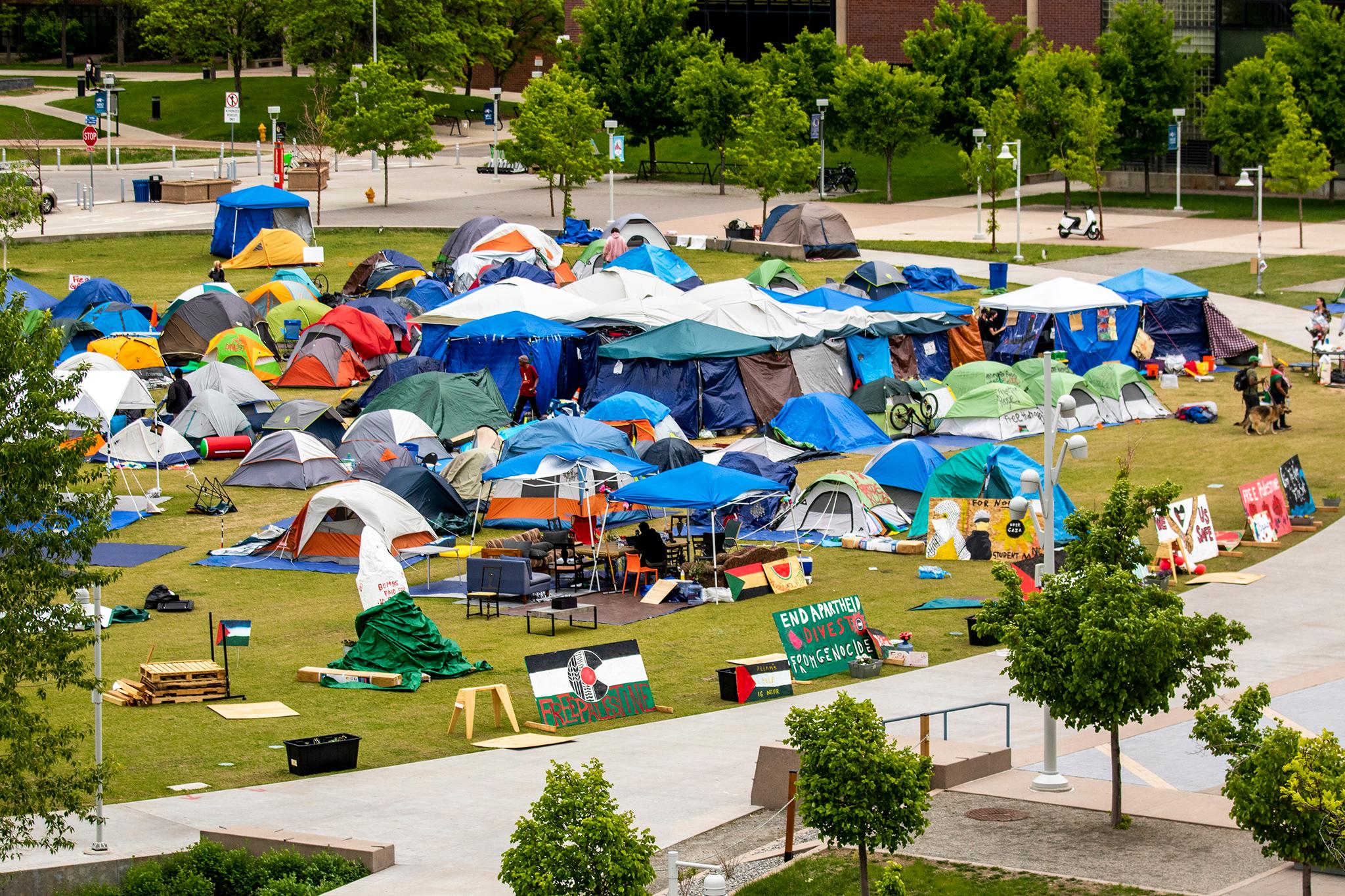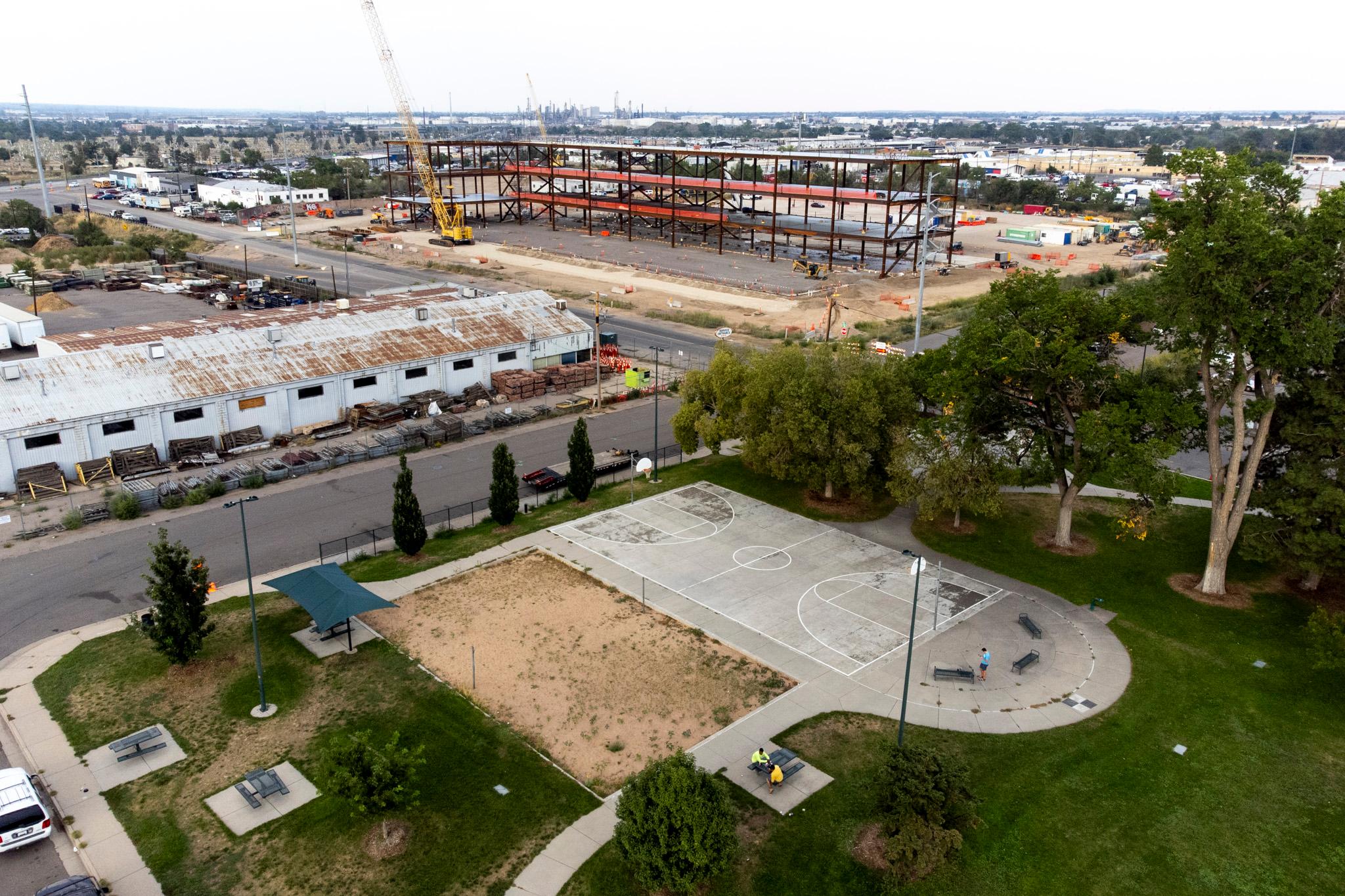City prosecutors have dropped charges against a number of protesters who were arrested at the a protest camp at the Auraria Campus in April.
The protest camp stood on the campus’ Tivoli Quad for about three weeks this spring. The protesters opposed Israel’s ongoing war in Gaza.
During the camp’s lifespan, a total of 80 individuals were arrested or issued summons for trespassing. It’s unclear how many of the charges are being dropped.
Forty arrests occurred just days after the camp was started, as several law enforcement agencies, including Denver police and sheriff’s deputies, were called to disperse the protest. About half of those arrested on that day were students, and at least three were professors.
The war in Gaza began in October 2023 after Hamas killed nearly 1,200 people in Israel, mostly civilians, and abducted more than 200 others. Since then, Israel’s military response in Gaza has resulted in an estimated 41,000 deaths in Gaza, including close to half who were women and children, according to the Gazan Ministry of Health. There also have been more than 350 deaths among the Israel Defense Forces.
Protesters' court hearings began in late summer, but some have since been dismissed.
Alex Boodrookas, a professor who teaches Middle Eastern history, was leaving a faculty meeting when he saw police officers attempting to disperse the camp. He sat down with students in solidarity. He was eventually arrested alongside two other professors and charged with trespassing and failure to obey a police officer.
The city claimed he refused an order to leave, but Boodrookas argued the orders had been given earlier and were not clearly audible to him when he arrived. Boodrookas said part of his aim in sitting with protesters was to de-escalate the situation and ensure students weren't hurt.
As he awaited trial, he and other protesters urged the Auraria Campus and the city to drop charges and avoid the stress of multiple trials.
After Boodrookas' jury trial was delayed to November, he was told Monday that his charges had been dropped altogether. While he’s relieved, he’s frustrated that the charges weren’t dropped earlier.
“I've had to spend a lot of time and a lot of energy and just a ton of stress on all of this,” Boodrookas said. “It's been an absolutely miserable and totally unnecessary experience.”
The Denver City Attorney’s Office confirmed that it has dropped charges for “a number of the Auraria Pro-Palestine protest cases.” In a statement to Denverite, the office gave three reasons for its dismissals, saying that at least one of the following things had happened in each case:
- The defendants “successfully completed the terms and conditions of their sentences
- Prosecutors “determined that there was no reasonable likelihood of conviction”
- Or “dismissal was determined to be in the interest of justice.”
The Auraria Campus, the entity that manages the campus where the University of Colorado Denver, Metropolitan University of Denver and Community College of Denver operate, has continually stressed that it and its three institutions of higher education are committed to freedom of speech, but maintained that protesters were in violation of a long-standing ban against camping on-campus.
“As we support the exercise of these rights, we remain dedicated to the legal process and the outcomes while maintaining a safe and respectful space for all students, staff, faculty, and community members,” a campus spokesperson said in an email to Denverite.
Protesters who haven’t had charges dropped are confused.
Paul Nelson, one of the primary organizers of the anti-war camp, said he’s heard from fellow protesters about charges being dropped. But his own case is still ongoing.
Nelson said he is still set for a jury trial in November, despite facing near-identical circumstances to those with dropped charges. Like other prosecutors, Nelson was arrested during a peaceful protest after police officers ordered protesters to disperse.
“It's my hope that they make the right decision and drop this injustice of a trial,” Nelson said. “It'd be a waste of the city's money.”
While Denver police aided in the initial attempt to disperse the anti-war camp, Denver police chief Ron Thomas later said he would refuse future requests to arrest protesters, stating he believed there was “no legal way” to do so.
Nelson is being represented by Andy McNulty, a civil rights lawyer at Newman McNulty. He said that he’s hoping the trial will be thrown out on discovery violation, due to the city attorney’s office allegedly failing to turn over relevant evidence in a timely manner, a strategy that has proven successful in other similar cases.
McNulty doesn’t know if the related cases against his two clients will be thrown out, but expects it could happen right before the trial is set to begin in November. Even if that happens, he feels his clients have already faced punishment.
“So even though the charges were dismissed against these protestors, they still had to show up to court multiple times,” McNulty said. “They still had the stress of this prosecution hanging over their head only for the city to just drop the charges right before trial. And so I don't know, it's punishment, from my perspective, it is punishment for protesting and there's nothing you can do about it.”
Editor's note: This article was updated at 9:16 a.m. on Oct. 15, 2024, with additional comment from Alex Boodrookas rebutting officials' claims about his actions.












